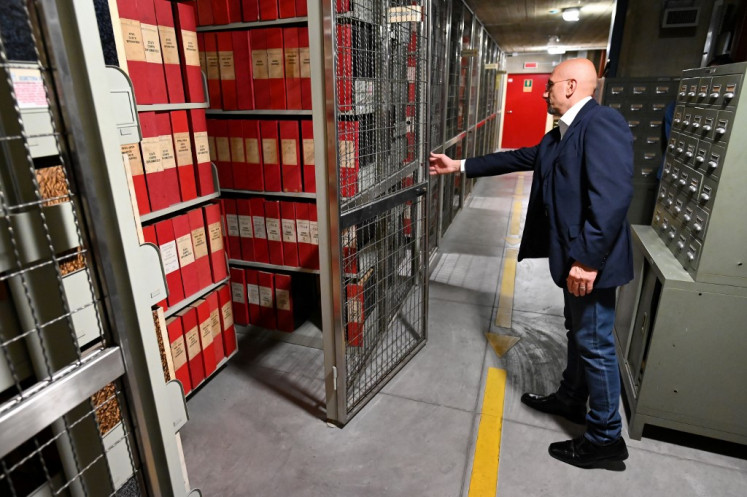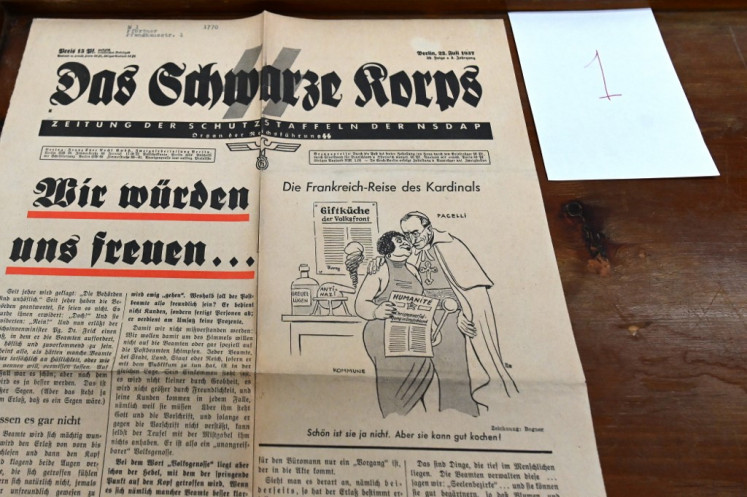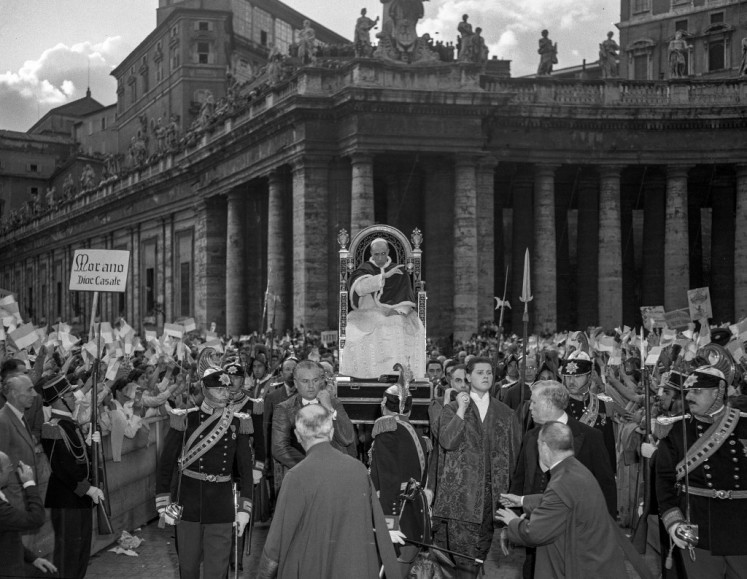Popular Reads
Top Results
Can't find what you're looking for?
View all search resultsPopular Reads
Top Results
Can't find what you're looking for?
View all search resultsVatican opens archives on history's most controversial pope
Change text size
Gift Premium Articles
to Anyone
 This July 1943 photo provided by Italian news agency Ansa on February 23, 2020 shows Pope Pius XII meeting with people from Rome's San Lorenzo district, after a violent bombardment caused severe damage to the buildings and the entire neighbourhood during WWII. - The entire Vatican archives on the pontificate of Pope Pius XII (1939-1958) are to open on March 2, 2020, a decision which had been called for decades by Jewish historians and organizations. (AFP/STRINGER / ANSA)
This July 1943 photo provided by Italian news agency Ansa on February 23, 2020 shows Pope Pius XII meeting with people from Rome's San Lorenzo district, after a violent bombardment caused severe damage to the buildings and the entire neighbourhood during WWII. - The entire Vatican archives on the pontificate of Pope Pius XII (1939-1958) are to open on March 2, 2020, a decision which had been called for decades by Jewish historians and organizations. (AFP/STRINGER / ANSA)
T
he Vatican unseals the archives of history's most contentious popes on Monday, potentially shedding light on why Pius XII stayed silent during the extermination of six million Jews in the Holocaust.
Two hundred researchers have already requested access to the mountain of documents, made available after an inventory that took more than 14 years for Holy See archivists to complete.
Award-winning German religious historian Hubert Wolf will be in Rome on Monday, armed with six assistants and two years of funding to start exploring documents from the "private secretariat" of the late pope.
Wolf, a specialist on the relationship of Pius XII with the Nazis, is anxious to discover the notes of the his 70 ambassadors -- the pontiff's eyes and ears during his time as head of the Catholic Church between 1939 and his death in 1958.
An attendant opens the section of the archive dedicated to Pope Pius XII on February 27, 2020 in the Vatican Apostolic Secret Archive, at the Vatican, the central archive of the Holy See where are kept all the documents concerning the government and pastoral activity of the Roman Pontiff and offices of the Holy See. - The March 2 unsealing of the archives of Pope Pius XII, the controversial World War II-era pontiff, whose papacy lasted from 1939 to 1958, has been awaited for decades by Jewish groups and historians. The controversy over Pius XII hinges on whether the head of the Catholic Church, a former diplomat of the Holy See in Germany, remained too silent during the Holocaust, never publicly condemning the Nazis. (AFP/Alberto PIZZOLI)There should also be records of urgent appeals for help from Jewish organisations, as well as his communications with the late US President Franklin D. Roosevelt.
The unsealed archives additionally cover a post-World War II era in which writers were censored and some priests hounded for suspected communist sympathies.
The Vatican first published the essentials covering the Holocaust four decades ago, an 11 volume work compiled by Jesuits.
But some crucial pieces are still missing, including the pope's replies to notes and letters -- for example, those about Nazi horrors.
The Jesuits already published "documents the pope received about the concentration camps, but we never got to see his replies," Wolf said in an interview.
"Either they do not exist, or they are in the Vatican," he told AFP.
Historians have already examined the 12 German years of Eugenio Pacelli, the future pope's real name which he used while posted there as the Holy See ambassador in 1917-1929
There, he witnessed the rise of Nazism, then returned to Rome to become the right-hand man of his predecessor Pius XI, elected in 1922.
Past archives have revealed exchanges in which he was alerted about the extermination of European Jews once he himself became the pope.
A picture taken on February 27, 2020 shows a copy of the SS newspaper "Das Schwarze Korps" dated from July 22, 1937 with a satirical cartoon showing Cardinal Pacelli embracing a woman, with traits representing France and communism, in the Vatican Apostolic Secret Archive, at the Vatican, the central archive of the Holy See where are kept all the documents concerning the government and pastoral activity of the Roman Pontiff and offices of the Holy See. (AFP/Alberto PIZZOLI)"There is no doubt that the pope was aware of the murder of Jews," Wolf said.
"What really interests us is when he learned about it for the first time, and when he believed that information."
Read also: 'Secret' no more: Pope renames historic Vatican archives
Cryptic Christmas message
On December 24, 1942, Pius XII delivered one of history's most debated Christmas radio messages.
Buried in its long text was a reference to "hundreds of thousands of people who, without any fault of their own and sometimes for the sole reason of their nationality or race, were doomed to death or gradual extermination".
Was his message -- delivered in Italian and aired just once, and which never explicitly mentioned either the Jews or Nazis -- heard and understood by German Catholics?
This undated photo provided by Italian news agency Ansa shows Pope Pius XII (carried at C on chair) blessing young people belonging to the Gioventu Catholic Action at St. Peter's Square in the Vatican. (AFP/ STRINGER / ANSA)"The only ones who heard it were the Nazis," said Wolf, noting that the radio waves were scrambled and that the pope could have spoken German -- if he had really wanted to reach the German faithful.
"After the war, Pius XII told a British ambassador: 'I was very clear.' And the ambassador will say in reply: 'I did not understand you'," the historian said.
Those who rise to the pope's defense note that Pius XII was a former diplomat who was trained in prudence, anxious to remain neutral in time of war, and concerned about being able to shield Catholics from the unfolding devastation.
He simply could not be any more explicit, Pius XII's supporters say. Historians estimate the Church hid around 4,000 Jews in its Roman institutions during the war.
"Quite a few Jews were saved in convents," David Kertzer, an American historian who won the Pulitzer Prize for a book about the era, told AFP.
"But why were they murdered by people viewing themselves as Christians?"
For Kertzer, the reasons behind the "silence of the pope" are key.
"He wasn't happy about mass murder. He seemed upset. He knew by 1941," said Kertzer.
And yet "never uttered the word Jew".
Wolf, the German historian, added that Pius XII "remained very withdrawn after the war, saying nothing about the Holocaust".
He also never recognized the creation of the State of Israel in 1948.
"Why?" Wolf asks.













